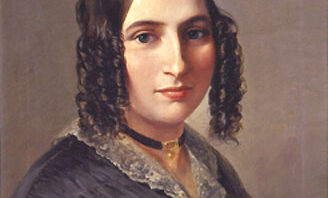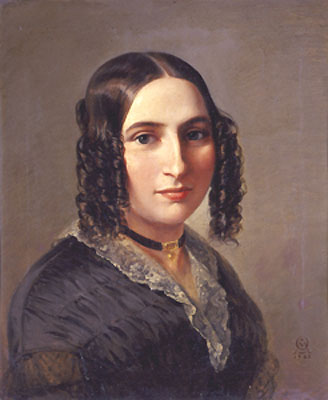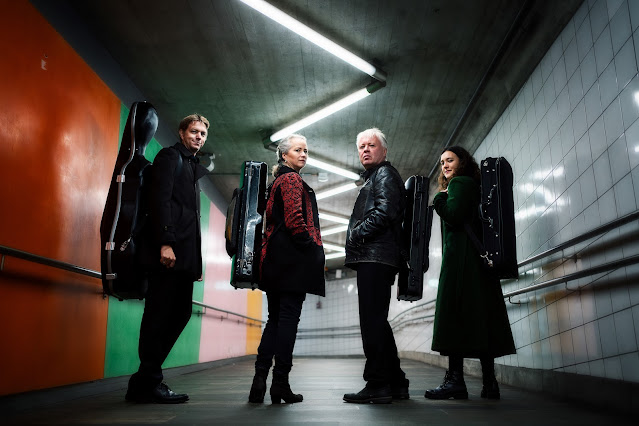
 |
| Fanny Hensel (Mendelssohn) in 1842 |
Mozart, Bartok, Maja Ratkje, Fanny Mendelssohn; Engegård Quartet; Conway Hall
Reviewed 21 April 2024
Playing of extraordinary vividness and presence by the Norwegian ensemble in a programme moving from Mozart and Fanny Mendelssohn to Bartok and contemporary Norwegian compose Maja Ratkje
The Engegård Quartet (Arvid Engegård, Laura Custodio Sabas, Juliet Jopling, Jan Clemens Carlsen) was at Conway Hall on Sunday 21 April 2024 as part of a UK tour which sees the quartet giving the BBC Radio 3 Lunchtime Concert on 26 April from LSO St Luke’s.
At Conway Hall, the Norwegian ensemble played a programme that began with Mozart’s Quartet No.22 in B♭ “Prussian” K.589 followed by Bartok’s Quartet No.3 Sz.85, then A Tale of Lead and Light by contemporary Norwegian composer Maja Ratkje and finally Fanny Mendelssohn’s Quartet in E flat. Before the concert, I gave a talk Three Contrasting Composers, exploring Fanny Mendelssohn, Bartok and Maja Ratkje and the background to their works.
Mozart’s Quartet K.589 is one of a trio that he dedicated to King Friedrich Wilhelm II of Prussia. The King was a talented cellist and all three quartets have a prominent cello part. The Engegård Quartet has recorded all of Mozart’s quartets [on Lawo Classics, see my 2020 interview with them talking about the recording] and what was noticeable from the outset in their performance was the way this was four equal lines, with a strong sense of equal interaction between them and a performance that was very present. There was a civilised elegance to the opening Allegro with a compelling sense of style, plus moments of drama. The Larghetto was notable for cellist Jan Clemens Carlsen’s lovely singing line, answered by the fine elegance of Arvid Engegård’s violin. The minuet had a crisp, no-nonsense feel to it, with disturbing moments in the trio, whilst the final Allegro assai was rather catchy, with a delightful character to the playing, carefree at first but then getting darker and more complex.
Bartok’s Quartet No. 3 dates from 1927 and the work was his most advance and most tightly constructed quartet to date, the composer having heard Berg’s Lyric Suite the year before being a big influence, along with the continuing underpinning of Hungarian folk-music. The opening section was intense and concentrated, four independent lines in vibrant and sometimes painful counterpoint, at times uncompromising yet with moments of tenderness. The second section was vivid, with folk-inspired motifs played with remarkable strength. The quartet created a sense of a closely worked argument with four independent people, attention must be paid. The third section is a varied recapitulation of the first, here the material moved from violence to bleak calm, whilst the final section, a compress variant of material from the second, was notable for its furious energy.
After the interval we heard Norwegian composer Maja Ratkje’s A Tale of Lead and Light, commissioned by the quartet in 2011 the work was affected by the terror attacks in Oslo during that Summer. Ratkje also has a career as an improvising vocalist, whilst as a composer she works with electronics and it was fascinating to hear how these elements seemed to shade into her writing for four string instruments. The work began with a feeling of phrases suspended in space, small gestures gradually accumulating until generating an underlying nervous energy, but still with a use of space. As the work progressed, the violence and intensity of the writing seemed to relate also to the music of Bartok that we heard in the first half. The work seemed to be unwinding to nothing, but then a collective violent intensity reappeared, only to die down again, a sense that the composer could not quite shake of the effect of the violent events around her, yet finally it ended with an astonishingly transparent, mobile texture that seemed to come out of nowhere, offering light and hope.
Fanny Mendelssohn wrote her Quartet in E flat in 1834 (when she was 29 and already married). It is her only mature essay in the genre and after the first, private performance, her brother Felix disapproved strongly of it, especially of what he perceived as an undisciplined approach to form! The four short movements are quite free and rhapsodic (the opening movement is certainly not the sonata form that would have been expected) and listening to the piece I was struck by its closeness to Robert Schumann’s collections of characteristic pieces, and wondered whether, in an ideal world, the composer might have used a slightly different form for the work. It was only published in 1988 and deserves to be far better known.
The opening Adagio ma non troppo was achingly yearning and richly textured, short yet remarkably free. The following Allegretto was steady yet full of character with a vivid central section that seemed to have lots of moving parts. The Romanze was lyrical, again with a rich orchestral texture with an urgent middle section, whilst the fast finale was full of joyful scurrying that reached a terrific climax.
 |
| Engegård Quartet – Jan Clemens Carlsen, Juliet Jopling, Arvid Engegård, Laura Custodio Sabas (Photo: Lars Bryngelsson) |
Never miss out on future posts by following us
The blog is free, but I’d be delighted if you were to show your appreciation by buying me a coffee.
Elsewhere on this blog
- Opera as it ought to be: Mozart’s Don Giovanni from Hurn Court Opera reviewed by James McConnachie – opera review
- Leeds Lieder 2024
- A Leeds Songbook and a showcase performance: Leeds Lieder Young Artists 2024 – concert review
- A day of French song with a focus on Fauré, with Graham Johnson making us love the composer’s late period, and James Gilchrist in fine form – concert review
- Engaging the audience: James Newby and Joseph Middleton in a folk-inspired programme at a cool Leeds café/bar – concert review
- The sound of an image: recent chamber music by New York City-based, Puerto Rican-born composer Gabriel Vicéns – record review
- A City Full of Stories: Anna Phillips on her work with Academy of St Martin in the Fields’ SoundWalk – guest posting
- Energy, discipline, & sheer love of music-making: National Youth Orchestra & National Youth Brass Band in Gavin Higgins – concert review
- No boundaries or rules: Yorkshire-based Paradox Orchestra is reinventing the orchestral concert – interview
- Full of good things: Sean Shibe and the Dunedin Consort in John Dowland, a new Cassandra Miller concerto and much else besides – concert review
- A little bit of magic: Victoria’s Tenebrae Responsories sung one to a part at the original pitch by I Fagiolini and Robert Hollingworth – record review
- Dramatic Britten, athletic Watkins and high-energy Mozart: Britten Sinfonia, Ben Goldscheider and Nicky Spence at Milton Court – concert review
- A lovely evocation of stillness and calm: Alastair Penman’s Quietude on his Meadowbank Music label – record review
- Bizet’s Carmen at Covent Garden: gritty realism & a reluctance to add any local colour & movement, redeemed by musical performances – opera review
- Home

